Living Spirit - Muslim Women's Project 2006: Appendices 3 and 4

Appendix 3: Living Spirit: Muslim Women and Human Rights Forum
The Right to Participate in Social Change
Thursday, 21 September 2006
Darebin Arts and Entertainment Centre
Cnr. Bell St & St Georges Rd, Preston, Victoria
PROGRAM
MC: Helen Szoke, Chief Executive Officer and Chief Conciliator of the
Equal Opportunity Commission of Victoria
REGISTRATION
9.00 – 9.30
Venue: Foyer
WELCOME
9:30 – 10.00
Venue: Courtyard
- Indigenous Welcome to Country and Smoking Ceremony - Joy
Murphy, Senior Woman Elder of the Wurundjeri People - Saara Sabbagh, Women’s Network Coordinator, Islamic Council
of Victoria - Introduction and overview of forum - Margaret Donaldson,
Director, Race Discrimination Unit, Human Rights and Equal
Opportunity Commission (HREOC)
DVD Presentation
(Combined session): ‘The Chaser’s War on Everything’
10.00 – 10.10
Venue: Theatre
Hypothetical
(Combined session): ‘Righting the Wrongs’: How would you respond?
10.10 – 11.00
Venue: Theatre
Facilitator: Hana Assafiri
Panelists include:
- Victoria Police
- Ken Nguyen, Legal Affairs Reporter, The Age
- Joanne Bonighton, Acting Human Resources Manager,
Woolworths Supermarket - Bob Morgan, School Principal, Alia Private School
- Sheikh Isse Musse, Imam of the Virgin Mary Mosque, Hoppers
Crossing - Benjamin Rice, Senior Legal and Policy Officer, Equal
Opportunity Commission Victoria - Julie Ouaida, Muslim woman
- Nurjan Eser-Salman, Multicultural Services Officer, Centrelink
- Maria Vamvakinou MP, Federal Member for Calwell
Questions to consider: Using scenarios based on true stories of
racial and religious discrimination and abuse under the themes of
human rights, negative stereotyping and misconceptions, the
hypothetical will ask the panellists ‘How would you respond’?
This addresses the sets of standards policy and decision makers
use to respond to incidents of discrimination and abuse.
MORNING TEA with politicians hosted by Maria Vamvakinou MP,
Federal Member for Calwell
11.00 – 11.30
Venue: Foyer
Session 1: "Injustice anywhere is a threat to justice everywhere"
(Martin Luther King)
Exploring Human Rights
11.30 – 1.00
Plenary
(Combined session)
Speakers
- Islam and human rights - Tasneem Chopra, Chair, Islamic
Women’s Welfare Council of Victoria (IWWCV) - Human rights issues facing Muslim women - Omeima
Sukkarieh, Acting Senior Policy Research Officer, Race
Discrimination Unit, HREOC
11.30 – 11.45
Venue: Theatre
Concurrent Workshops
(Please choose one of the following workshops)
11.45 – 1.00
Workshop 1: ‘My rights are your rights’
Human rights and young women
(For young women only)
Facilitator: Nadia Mohamed, Youth Worker, Centre for
Multicultural Youth Issues (CMYI) and Dakhylina Madkhul, Board
of Management, IWWCV, Probationary Psychologist and Student
Welfare Coordinator and Counsellor
Questions to consider: What is the role of Islam in your life?
What are your human rights issues? How can you practically
apply human rights to your life?
Venue: Courtyard / Foyer
Workshop 2: ‘Out of the shadows’
Human rights issues facing Muslim women
Facilitators: Sultan Cinar, Citizenship and Anti-Violence Project
Worker, IWWCV
Questions to consider: What are your human rights issues and
how can you address them? What do you know about human
rights? What is the role of Islam and human rights in your life?
Venue: Jacaranda Room
Workshop 3: ‘‘A new world’: What the new anti-terrorism laws mean to you?
Facilitators: Marika Dias, Community Lawyer and Legal Education
Worker, Western Suburbs Legal Service
Questions to consider: What are the new anti-terrorism laws?
How do they impact on your life? How are your rights protected?
Venue: Acacia Room
Workshop 4: ‘How I can, NOT why I can’t’?
Why should I make a complaint and how to cope with crisis
Facilitators: Susan Newell, Senior Policy Research Officer, Race
Discrimination Unit, HREOC and Najwa Yassin, Community
Development / Parenting Worker, IWWCV
Questions to consider: What are the complaints
procedures/mechanisms available? Where can you go for help?
How can the complaints process be improved? Why is it
important to report incidents? What can I do if I do not wish to
make a formal complaint? What are some conflict resolution skills
I need?
Venue: Theatre
Workshop 5: ‘Lost in translation, found in respect’
Helping Muslim women cope with racial and religious
discrimination and abuse
Facilitators: Hutch Hussein, Business Development Manager,
Northern Migrant Resource Centre and Laila El-Assaad, Education
Officer, Muslim Women’s Association of South Australia
Speaker: Rebecca Smith, Community Development Worker,
Western Suburbs Legal Service will provide a brief overview of the
impacts of discrimination on Muslim women identified in the
Racial & Religious Discrimination, Vilification and Harassment Project
Questions to consider: What are the personal and social impacts
of discrimination on Muslim women? What are some of the
preventative measures you can take in the workplace? How can
Muslim women be supported? What are the skills needed for
social support services to help Muslim women cope in crisis
situations including racial and/or religious abuse? What cultural
and religious competency is necessary in the workplace and how
can policies and procedures be improved to reflect the needs of
Muslim women? Is translation enough?
Venue: Grevillia Room
LUNCH
includes drumming workshop facilitated by Tania
Bosak, Pulse Drumming
1.00 – 2.00
Venue: Foyer / Courtyard
MC: Voula Messimeri, Chairperson, Federation of Ethnic Communities'
Councils of Australia
Session 2: ‘I’m not racist but…’
Confronting negative stereotypes and misconceptions
2.00 – 3.30
Plenary: ‘Learning from history - an Indigenous perspective’
(Combined session)
2.00 – 2.15
Speaker: Joy Murphy, Senior Woman Elder of the Wurundjeri
People
Venue: Theatre
Concurrent Workshops
(Please choose one of the following workshops)
2.15 - 3.30
Workshop 6:
‘Critical Connections’ -
Freedom of speech vs racial vilification
Facilitators: Peter Manning, Adjunct Prof. of Journalism at
University of Technology (UTS) and Author of "Us and Them: a
journalist's investigation of Media, Muslims and the Middle East"
(Random House, Sept. 2006) and Farah Farouque, Social Affairs
Editor, The Age
Questions to consider: A question and answer session focusing on
the following, Muslim women and the media and how can
Muslim women engage in them? When does freedom of speech
violate human rights? What is the role of media? How can you
engage in the media debate? What do media need to know?
Venue: Theatre
Workshop 7 ‘Image vs Reality – how to answer the hard questions’
Our responsibility to combat negative stereotypes
Facilitators: Doug Weller, Director and Team Leader, Corporate
Media Services, and Joumana El Matrah, Manager, IWWCV
Questions to consider: How can you combat negative
stereotyping? What are the FAQ’s that you need to know the
answer to? How do you respond to basic questions, e.g. ‘why do
you wear the hijab?’ ‘Why are Muslim women oppressed?’ ‘Why
are all terrorists Muslim?’ ‘What does Islam say about terrorism?’
‘What does Jihad mean? Why do Muslim women get married so
young?’ etc.
Venue: Acacia Room
Workshop 8: "Race is just lines drawn on a map" (Voices of Australia contributor, Marat, SA)
Understanding Stereotypes for Young Women
(For young women only)
Facilitators: Faten Mohamad, Citizenship and Anti-Violence
Project Case Worker , IWWCV and Moona Hammoud, Youth
Women’s Project Worker, IWWCV
Questions to consider: What are stereotypes? Confronting your
own prejudices and how can you combat negative stereotypes?
How does cultural, religious and national identity relate to your
self-esteem and affect stereotypes? Why is self esteem important?
How do you empower yourself and others?
Venue: Courtyard / Foyer
Workshop 9: ‘Educate a woman, educate a nation’
The importance of combating negative stereotypes
Facilitator: Gabrielle Fakhri, Cultural Consultant
Questions to consider: using a role play and examples of existing
stereotypes of Muslims and non-Muslims, how accurate are these
stereotypes? Have you ever used these stereotypes? Correcting the
stereotypes? How do these make you feel? Confronting your own
prejudices and how can you combat negative stereotypes? How
does cultural, religious and national identity relate to your selfesteem
and affect stereotypes? Why is self esteem important? How
do you empower yourself and others?
Venue: Jacaranda Room
Workshop 10: ‘Creating possibilities’ – a conversation between generations about experiences of discrimination
How to make a difference together in your family, community
and life
Facilitators: Fatima Kourouche, State Advisor, Active After school
Communities, Australian Sports Commission, South Western
Sydney Area Health Service, Bilingual Community Educator,
Women’s Health, and former Coordinator of Parenting Education
Network, and Mariam Kourouche (Fatima’s daughter),16 year old
student at Malek Fahd Islamic School
Session will also include Leadership Training conducted by
Nurcihan Ozturk, Executive Officer and Dalal Samaan, Vice
President from the Victorian Immigrant and Refugee Women’s
Coalition
Questions to consider: Using a mother and daughter style role
play, how do different generations of women experience and cope
with discrimination and abuse? How can they make a difference
to the way they respond to discrimination and abuse? What are
the issues mothers and daughters face? How can they better
understand each other? How can they better engage themselves in
each other’s lives? How can they help empower each other and
themselves to change their lives and the people around them?
Venue: Grevillia Room
AFTERNOON BREAK
includes the screening of ‘Veiled Ambition’
for optional viewing
(‘Veiled Ambition’ is an inspiring documentary about "a little
Aussie battler in a scarf" and her dream to create a fashion
empire’)
3.30 – 4.00
Venue: Foyer
Plenary: What’s available and how to get involved in projects that
affect you?
4.00 – 4.10
(Combined session)
A presentation on existing state government and community
projects presented by Robyn Morgan, Acting Director, National
Action Plan and Jane Teafey, Project Officer, Community Support
Section, Department of Immigration and Multicultural Affairs
(DIMA)
Venue: Combined Jacaranda
and Grevillia Rooms
Closing: ‘Participating in change ’ - capacity building and
empowerment
Strategies for the future
(Combined session)
4.10 – 4.30
- Vision for a better future – overview of suggested strategies of
forum, question and answer – Joumana El Matrah, Manager,
IWWCV - Where to from here – closing and what next, including future
strategies Margaret Donaldson, Director, Race Discrimination
Unit, HREOC
Venue: Combined Jacaranda
and Grevillia Rooms
CLOSING DINNER TO MARK THE BEGINNING OF RAMADAN
CAFE UMUT (TURKISH RESTAURANT) –
369 HIGH STREET, PRESTON
5.30 – 7.30
(THIS WILL BE FREE AND ALL FOOD IS HALAL. CHILDREN
WELCOME. (PLEASE RSVP FOR THIS ALSO)
Other Details:
Waratah Room - Childcare available in Waratah Room with qualified child care workers
Exhibition Hall - ‘Why Women Matter’ – personal achievements, amazing contributions
Exhibition profiling achievements of everyday Muslim women.
Exhibition Hall – all day prayer space available
Foyer – ‘Living Spirit’ Mural – available for women throughout the day to draw, write, paint, etc
expressing their hopes, needs, future aspirations in the context of human rights and Muslim
women. We hope that this mural will express what participants want the broader community to
learn from what they have throughout the day.
For further information please visit: http://www.humanrights.gov.au/racial_discrimination/livingspirit/
Location & Map
Address:
Darebin Arts & Entertainment Centre
Cnr Bell St & St Georges Rd
Preston
VIC 3072
Parking:
Car Parks: The Darebin Arts &
Entertainment Centre Car Park provides 180
unrestricted car spaces. Enter the car park
via Peter Street, or St Georges Rd.
Street Parking:
Unrestricted parking is also available on St
Georges Rd (East end).
Disabled Parking:
4 disabled car spaces are
available in the car park.
Public Transport
The Darebin Arts & Entertainment Centre is
easily accessible by train, tram and bus.
The nearest public transport is Bell train
station a short 2-3 minute walk along Bell
St, Preston.
Train
Catch the Epping line train to Bell Station.
The Darebin Arts & Entertainment Centre is
a further 2-3 minute walk along Bell St.
Tram
Catch the Route 86 Tram - Docklands to
Bundoora RMIT (Plenty Rd/McKimmies Rd).
Stop 44 at the corner of Bell St and Plenty
Rd, a further 7-10 minute walk to the
Darebin Arts & Entertainment Centre.
Catch the Route 112 Tram - South
Melbourne / St Kilda Beach - West Preston.
Stop 40 at the corner of Bell St and Gilbert
Rd, a further 10 minute walk to the Darebin
Arts & Entertainment Centre.
Bus
Catch Route 513 - Eltham - Glenroy (via
Lower Plenty Rd & Greensborough), which
runs along Bell Street.
Bus Stops are located 20-50 metres from
the corner of High St and Bell St, Preston.
For more public transport information
please call 131 638 or visit the Metlink
Melbourne website:
www.metlinkmelbourne.com.au
Appendix 4: Profiles
Dalal Oubani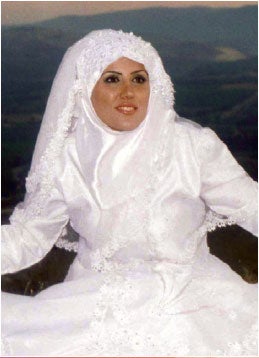
Dalal is originally from South Lebanon. She is 27 years old
and recently married, has completed a university degree in
Medical Science and a degree in Business. Dalal is currently
a secondary school science teacher in Sydney.
"Over the years my contributions to both my local and
general communities have been through assistance in writing
reports on human rights and participating in projects, which
aim to facilitate this crucial goal. I left the corporate sector to
pursue teaching not just to achieve a balance in my life but
to also use my skills to help the many disadvantaged
Australian youth struggling to make sense of the world. I care
about all Australian youth regardless of their background, but
my heart especially goes out to the alienated Australian
Muslim and Arab youth in our schools who are not given a
‘fair go’ and often with not enough support to fulfil their
potential. I believe this minority group has unfairly become
the underdog of Australian society for no reason other than
believing that ‘God is one’.
I believe that there can be no harmony and justice in society
if inequality is accepted and endorsed by our politicians and
the general public. Working towards better human rights is
everyone’s responsibility. There can be no winners when
there is inequality because society is like a stream where a
ripple in one end can affect the harmony and peace of the
whole stream. My hope is to work in a school populated with
Arab youth as I feel this is where I would be most effective.
Later I would like to manage a tutoring business part-time
and work overseas. I feel this would increase my
understanding and skills and help me become a greater
resource as a teacher."
Mariam Rind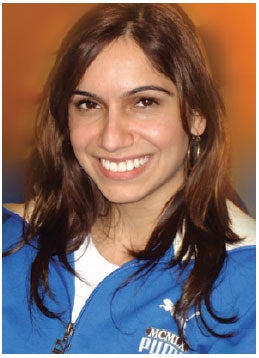
Mariam is an Indigenous Australian Muslim who is in her 5th
year of medicine at the University of Western Australia.
"I’m lucky to have come from such a diverse background. I
was born in Port Hedland in Western Australia in 1980 and
have lived in Australia for most of my life. My mother is an
Indigenous Yamatji woman and her family originated from
Mount Magnet. My father is from an area called Balouchistan
which is near the border of Iran and Pakistan. My Indigenous
legacy began when my great grandfather travelled to South
Australia as a camel driver in the late 1800’s. He then ended
up marrying an Indigenous woman who reverted to Islam, and
from there our family became!
My interest in becoming a doctor is driven by my cultural and
historical background. I have seen so much growing up. I don’t
think you have to travel to a 3rd world country to appreciate
humanity and the importance of the provision of basic
resources. Living in Australia and seeing my Indigenous people
experience conditions which should not even be present in
such a country, has given me some insight into the great need
for more Aboriginal doctors. As a Muslim I also appreciate the
need and demand for more female Muslim doctors, and thus,
hope to benefit both the Muslim and Indigenous communities
by sharing a similar background and offering culturally
appropriate care.
Studying medicine has not been easy. But giving up is not in
my vocabulary. I have been awarded various scholarships to
assist me in my studies. Both academic achievement and the
desire for doing more community work in the future have
helped me achieve much both academically and personally. I
have been a mentor at camps targeting Indigenous youth and
have been actively involved in encouraging tertiary education
amongst Indigenous youth. It is important that our youth have
good role models and that’s what I hope to be.
I’ll continue to study and one day I hope to be able to use my
knowledge to help people, regardless of religion, background,
or culture. I think that’s why medicine was so appealing. It’s a
great avenue to helping others and easing the suffering of
others is a basic human right which I’m proud to be part of.
Ultimately, saving lives is in the hands of God, but God has
also given us hands to help save lives too."
Chahida Bakkour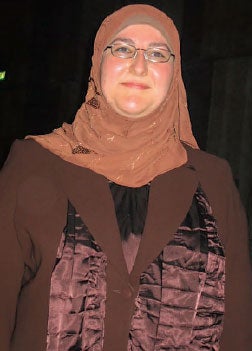
Chahida is a Victoria University student currently
undertaking a Bachelor of Business (Computer Systems
Management). She is also a Sessional IT teacher at Victoria
University. In 2006 Chahida was awarded the Victoria
University TAFE Student of the Year – Vocational Award and
Victoria University Outstanding Student Award – School of
Human Services, Science and Technology.
"I left Secondary School in 1992 without completing year 11.
In 2003, after getting married and having two children I
returned to study. I enrolled in and completed Certificate I in
Information Technology during 2003. By the end of 2004 I
completed Certificate IV in Information Technology. By 2006
having completed a Dual Diploma in Information Technology
(Web Development and Internetworking) and Certificate IV in
Assessment and Workplace Training I was offered the
opportunity to do some sessional teaching at Victoria
University (VU). I also do web design which has become my
new hobby.
I felt hesitant about returning to study and was not confident
as to how I would fit within the study environment being a
Muslim and mature age student. I was also apprehensive as
to what was expected of me as an adult learner and was not
aware of my capabilities.
Whilst studying I have faced many obstacles, but my greatest
achievement was having the strength to keep going no matter
what type of obstacles were in my way. I was able to show
the people around me and more importantly prove to myself
that I was capable of studying and at the same time
successfully fulfilled my role as a wife and mother of two
school age children. Learning has presented me with
challenges both personally and academically. My
achievements have come from perseverance and the support
of family, friends, peers and the excellent teachers at Victoria
University. I encourage everyone to go for their dreams."
Fatima Killeen
Fatima was born in Casablanca, Morocco and is an
accomplished Australian and international artist based in
Canberra.
I studied at the school "Les Beaux Arts" of Fine Art in
Casablanca. During this time I was selected for an engraving
workshop at the Asilah Arts Festival and on my graduation I
was presented with the Award of Excellence.
In 1988 I was accepted into the Corcoran School of Art in
Washington DC where I studied painting and photography.
While at the Corcoran, I was awarded the Dean's Merit
Scholarship.
I came to Australia in 1994 and continued my Bachelor
Degree in painting and printmaking at the Canberra School
of Art (ANU). In 1997, I graduated with First Class Honours
and three Graduation awards (VETA, Mallesons Acquisition
Award & Megalo printmaking residency).
Since my graduation in 1997, I have taken part in group and
solo exhibitions in Canberra and Sydney. The work "Stored
Memories" was acquired by the Canberra Museum and
Gallery in 1998. During 2001, I received the Wattan Art
Prize at the Powerhouse Museum in Sydney.
I have received a number of art grants to assist in the
production of new works. My artworks are held in the
Australian War Memorial, the Australian National University,
and in private collections in Sydney & Canberra, Morocco,
Singapore, Zimbabwe, Germany, Switzerland, Los Angeles,
Ohio & Washington DC.
My wish is that the great need for communication between
different communities, countries and faiths will be fulfilled in
order to achieve peace, tolerance and a positive dialogue.
Art is one vehicle of expression for such communication. The
resolve of the people to change is in their own hands and not
in the hands of deceptive politicians who are only interested
in electioneering and self promotion."
Rawan Abdul-Nabi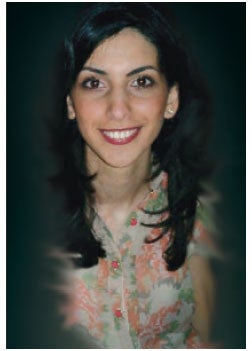
Rawan is a Palestinian Australian currently completing a
Bachelor of Arts Degree with Honours at Sydney University
combining the disciplines of Sociology and Arabic and
Islamic Studies to sustain for what she believes is exciting
and compelling research.
"In the past few years I have participated in and achieved a
number of things which have laid the foundations for a fairly
active life in the pursuit of social justice. After finishing high
school successfully I set off to take on an academic pursuit in
the social sciences and humanities.
As in during my later years in high school where I was
elected to various roles in leadership, including school Vice-
Captain and through on to university life, I am an active
member of the community, striving to raise awareness,
provide support bases and promote understanding and foster
social and cultural awareness by continuing to campaign for
human rights and social justice. My most passionate defence
remains in the struggle for Palestinian human rights and
justice and the fair representation of Palestinian, Arab and
Muslim peoples. I was a founding member and President of
the Sydney University Arab Students Association and an
Executive Member of the Sydney University Muslims Students
Association. I served on Union committees and was a
Councillor of the Student Representative Council, a delegate
to the Asia-pacific Model United Nations Conference with a
passion for advocating for human rights. My public role
remains and I participate and speak on many panels, at
rallies and meetings giving voice to Palestine and Arab and
Muslim women.
I think Australia must urgently improve its defence and
waging of human rights. We cannot any longer demonise
those seeking refuge here and it is abhorrent to detain those
who arrive deemed ‘illegally’. Certainly we also cannot be
part of wars that intend to wage peace but bring nothing but
death and destruction."
Zahra Shafaq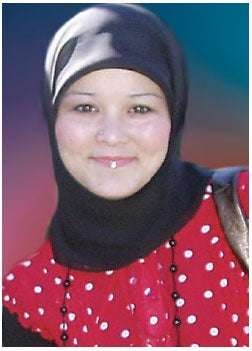
Zahra is 20 years old and a refugee who fled Afghanistan in
1998 and escaped to Pakistan. Zahra arrived in Australia in
2001. She is currently undertaking her Higher School
Certificate (year 12) at Holroyd High School.
"I was in a refugee camp across the border of Pakistan and
Afghanistan for a year. For two years after that I lived outside
the camp as normal as possible hoping to come to Australia
and have a better future in my education, life and with my
family. When I first arrived in Australia in May 2001 I arrived
in Sydney. I came to Holroyd High Intensive English Centre
and was there for a year. With my determination I moved to
mainstream classes at Holroyd High School in the last term
of Year 9.
I am one of the young ChillOut (Children Out Of Detention)
Ambassadors and was made one in 2004. Since then I have
been going to private, public and primary schools to talk
about and share my amazing experiences as a child refugee
and the coping strategies of the hardships I come to face
everyday as a refugee in Australia. This whole experience has
been a great benefit. I realised that there are still good human
beings out there because once upon a time I forgot they ever
existed, especially after witnessing the war in my country of
birth.
I started writing my own unpublished poetry and short stories
regarding true life stories. I was also invited as a guest
speaker at the Sydney Writers’ Festival in 2004, speaking
about my experiences.
As for the future of human rights, I believe and hope that
everyone in the future will have equal rights whether it’s in a
business, in a home, or in a country, or even around the
world. Everyone deserves the same rights because everyone
is born with those rights just like everyone is born with a
brain.
I hope also that the Human Rights Commission in Australia
continues to give voice to the public."
Faten Jamalaldin Mohamed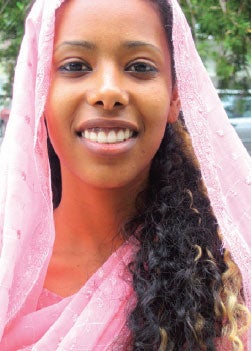
Faten was born in Khartoum, Sudan and migrated with her
family to Australia over 12 years ago. She has completed a
Social Science Degree at the Royal Melbourne Institute of
Technology (RMIT). Faten is currently working at the Islamic
Women’s Welfare Council of Victoria as the Citizenship and
Anti-Violence Project Case Worker.
"My father is Sudanese and my mother is from Eritrea. I have
always been involved in both the Eritrean and Sudanese
communities in Melbourne from a young age, and enjoy
being involved in community activities.
My biggest achievement has been my involvement in a group
called ‘Sudanese Youth for Reconciliation and Hope’. It is a
group of eleven young people from North and South Sudan
working together to reconcile a country and community
divided by a devastating 50 year civil war. We aim to
empower young people from Sudanese background living in
Australia and around the world to take up a leadership role
and to actively participate in sustaining peace in Sudan and
to work together on building a nation free of religious and
racial hatred."
Yasmine Ahmed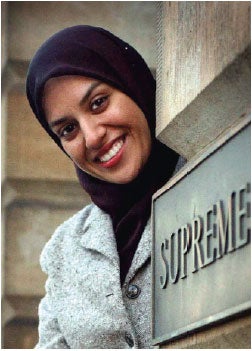
Yasmine is a lawyer who is currently working as an
Associate to the Honourable Justice Sultan at the Supreme
Court of South Australia. Yasmine has completed her
Honours in Law at Adelaide University, a program in
International Law at Uppsala University in Sweden and a
Bachelor of Media at Macquarie University in Sydney.
Yasmine has been awarded numerous scholarships for her
achievements, worked in The Hague, was the Founder and
President of the Australian Refugee Support Group and a
member for the South Australian Muslim Reference Group.
"Who am I and what do I aspire to do? Good question! Well,
I am many things. I am Australian, I am Muslim, I am a
daughter, I am a lawyer, and I am a human rights activist. I
hope to be the voice for those who do not have one. I hope
to give others the confidence, encouragement and love to
fulfil their dreams as I have been given. I currently work as
an assistant to a Jewish Judge in the Supreme Court of South
Australia and I hope to work in the field of human rights law
and continue to do what I love.
I hope to one day see a typical ‘Aussie’ identified as someone
who is not of a particular religion, race, colour or creed, but
whose identity is accepted as one which is made up of many
facets and which is so much the better for it."
Khadija Sukkarieh 
Khadija is 60 years old and has 7 children and 11
grandchildren. She has been the primary carer of her
physically and intellectually disabled son for over 30 years.
"I came to Australia in 1978 from Lebanon, after escaping the
civil war. It took me 14 years to go back to Lebanon to see
my family again. It has always been important for me to
make sure my children and grandchildren remember their
origins and heritage. They all speak Arabic and I love having
my grandchildren sitting around me while I make Lebanese
woodfired bread and yoghurt and cheese and things like that.
I believe that if your children respect there heritage, they
learn to respect the country and the environment of which
they live. Respecting human rights is like making yoghurt. It's
an easy recipe but takes a long time to make possible. It’s
also like taking care of someone who has a severe disability.
It is in your blood. It takes a lot of nurture and patience. I
live human rights every day especially as a carer. The human
rights of people with a disability are often forgotten but as a
mother I have had to fight for that all along in order to
provide for my children and especially to make sure that my
son has the best quality of life he can. That's what I live for.
I encourage every Muslim woman in Australia to do
something good for herself. For her children and for her
family. God created human beings to live not to live to be
judged by anyone. Every person has basic human rights.
They should live in freedom and without misery and threat.
God created people to live in dignity and not to be treated in
any other way."
Frida Dakiz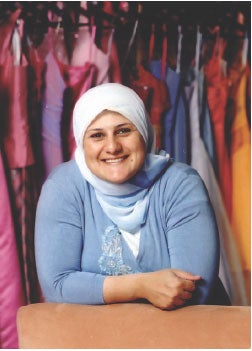
Frida is 29 years old and married with a baby. She is a
young Lebanese entrepreneur with a fashion boutique in the
heart of Melbourne’s Sydney Rd. With a background in
catering, four years ago Frida made the leap from food to
fashion when she opened her first clothing store ‘Frida
Boutique’ catering exclusively for Muslim women. Over the
past twelve months she has diversified and expanded her
business into the competitive world of after-five and on-line
fashion retailing with her flagship store ‘Sassy Boutique’.
Her dreams for the future are to be successful in her chosen
field and have a number of stores across Australia.
Frida was recently the subject of ‘Veiled Ambition’, a half
hour documentary for SBS TV and winner of the ‘Best short
film promoting Human Rights’ at the 2006 Melbourne
International Film Festival.
"My future aspirations for Muslim women are that more
venture out into the business world and not be deterred by
the general community’s reaction to how they look and what
they believe in. Understanding on both sides is important."
